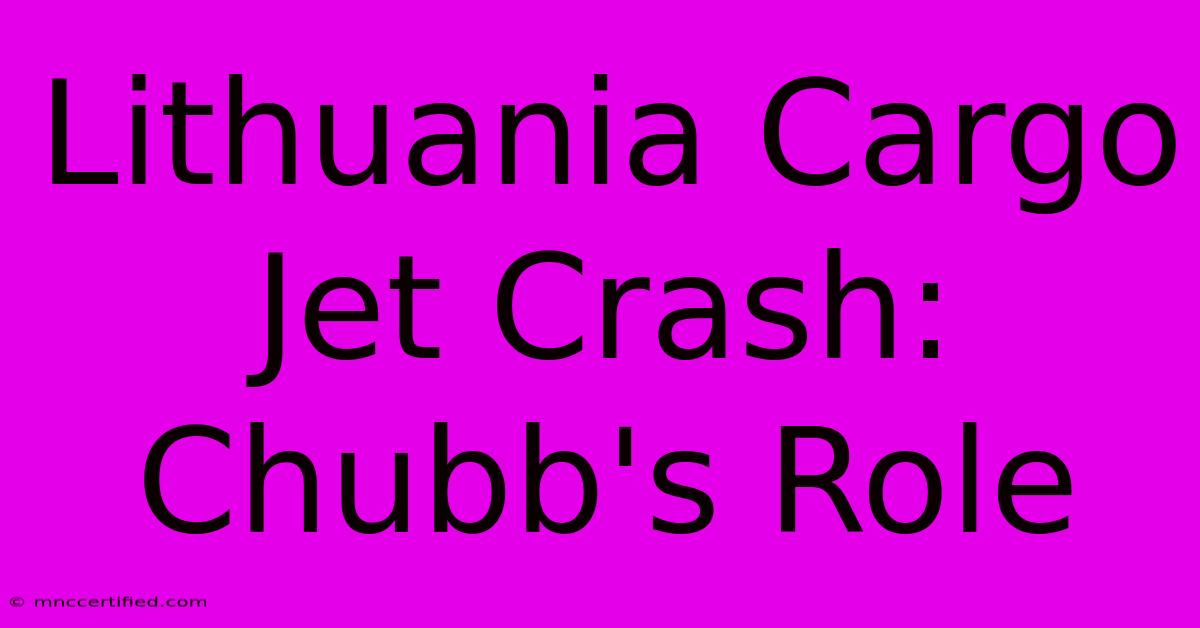Lithuania Cargo Jet Crash: Chubb's Role

Table of Contents
Lithuania Cargo Jet Crash: Unpacking Chubb's Role in the Aftermath
The tragic crash of a cargo jet in Lithuania sent shockwaves through the aviation industry and sparked crucial conversations about insurance and liability. This incident highlights the often-unseen but vital role of insurance giants like Chubb in managing the aftermath of such devastating events. This article delves into the specifics of the Lithuanian cargo jet crash, exploring Chubb's potential involvement and the broader implications of aviation insurance in the face of catastrophe.
The Lithuania Cargo Jet Crash: A Summary of Events
While the specific details surrounding the crash may vary depending on the ongoing investigations, a concise summary is crucial for understanding the context of Chubb's potential role. (Insert concise summary of the Lithuanian cargo jet crash here, including date, location, aircraft type, casualties, and preliminary findings if available. Source the information appropriately with links to reputable news organizations).
Key Questions Surrounding the Crash
Several critical questions remain unanswered following the crash, many of which will directly influence the insurance claims process:
- What was the cause of the crash? Determining the root cause—be it mechanical failure, pilot error, or other factors—is paramount in assigning liability.
- What was the value of the cargo? The value of the lost cargo significantly impacts the insurance payout.
- Were there any pre-existing maintenance issues? Pre-existing problems can influence liability and the insurance claim process.
- Who were the involved parties? Identifying all stakeholders – the airline, cargo owners, airport authorities – is crucial for navigating the complex insurance landscape.
Chubb's Potential Involvement: Aviation Insurance and its Complexities
Chubb, a leading global insurance company, likely plays a significant role in this tragedy, depending on the insurance policies in place. Their potential involvement could cover several areas:
Hull Insurance: Protecting the Aircraft
The aircraft itself would likely have been insured under a hull insurance policy. This policy covers damage or loss of the aircraft itself. Chubb, with its significant presence in the aviation insurance market, could have been the insurer or a reinsurer for the aircraft. The payout under this policy would depend on the extent of the damage (total loss in this case) and the policy terms.
Cargo Insurance: Covering the Lost Goods
The cargo on board would have been covered by separate cargo insurance policies. These policies vary widely depending on the type and value of the goods. Chubb, again, could be involved as the insurer or reinsurer for a portion or all of the lost cargo. Assessing the value of the lost goods and processing claims will be a lengthy and complex process.
Liability Insurance: Addressing Third-Party Claims
Liability insurance covers potential claims from third parties affected by the crash. This could include claims from families of victims (if any), property damage near the crash site, and other related incidents. While Chubb might not be directly involved in every liability claim, they could be a significant player in the overall insurance response depending on their policy agreements with the involved parties.
The Broader Implications: The Role of Aviation Insurance
This crash underscores the crucial role of aviation insurance in mitigating financial risks associated with air travel. The complex process of claims assessment and settlement following a major incident like this highlights the need for:
- Robust insurance policies: Comprehensive and clearly defined policies are essential to ensure adequate coverage.
- Transparent claims processes: Efficient and transparent claims handling is crucial for all involved parties.
- Effective risk management: Proactive risk management measures by airlines and other stakeholders are critical in preventing future accidents.
Conclusion: Awaiting Further Developments
The full extent of Chubb's involvement in the aftermath of the Lithuanian cargo jet crash will likely unfold over time. As investigations progress and claims are processed, a clearer picture of the insurance company's role in addressing the financial ramifications of this tragedy will emerge. This incident serves as a stark reminder of the critical role insurance plays in the aviation industry and the complexities that arise in the wake of catastrophic events. Further updates will be provided as they become available. (Include links to official sources, relevant aviation safety organizations and news outlets for further information).

Thank you for visiting our website wich cover about Lithuania Cargo Jet Crash: Chubb's Role. We hope the information provided has been useful to you. Feel free to contact us if you have any questions or need further assistance. See you next time and dont miss to bookmark.
Featured Posts
-
Russia Imposes Ban On Top Uk Officials
Nov 27, 2024
-
Man City 3 3 Feyenoord Match Analysis
Nov 27, 2024
-
Balde Ready For Barcelona Brest Ucl
Nov 27, 2024
-
Italiano Insurance Boca Grande
Nov 27, 2024
-
Bayern Munich Vs Psg Watch Live Odds
Nov 27, 2024